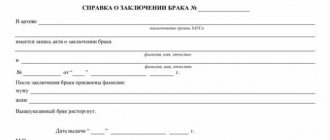Deposit is the amount of money that the bank accepts from the client, intended for savings and accumulation. After the owner passes away, the contribution, like any inherited property, will pass to the heirs.
Inheritance is carried out:
- According to a will drawn up by a notary;
- According to a testamentary disposition drawn up in the bank;
- In law.
If the deceased did not leave a will or testamentary disposition, then inheritance is carried out according to law. Regardless of the will of the testator and the officially executed will (testamentary disposition), the legislation defines categories of persons who are necessarily entitled to a share of the inheritance.
The law defines the period for entering into inheritance as 6 months. If for some reason the heirs do not exercise their right, the period is restored; for this, a statement of claim must be filed with the judicial authorities. Inherited deposit funds are not subject to tax.
Disposal of property
There are 3 ways to inherit money from a deposit: by law, by will or testamentary disposition. The investor can draw up a will and make whoever he wants as an heir. If there is no will or testamentary disposition, the right to receive money is determined by law:
- Close relatives are first in line: children, spouses, parents.
- If they are not there, then the right passes to the second-order heirs: brothers, sisters, grandparents.
- In the Russian Federation, heirs up to the eighth stage are registered; this category includes disabled dependents.
- If there are no heirs in any of the queues, the money on the deposit goes to the state.
It is important to take into account that the will is more important than the legislative order. Any relative can be included in a will, regardless of the degree of closeness. But disabled relatives, even if they are not in the will, will receive a certain part of the money, since the law protects this category of citizens. These may be minor children, elderly parents or other dependents of the deceased.
Any property can be distributed among the relatives of the deceased on the basis of a will or legislation. But when inheriting deposits, testamentary dispositions are more often used. It is easier to draw up, but has the same legal force as a will.
A testamentary disposition is practically no different from a regular will, but it concerns one bank account or all accounts in the same bank. If there are several deposits in different banks, an order is needed in each one. As with a regular will, more than one person can be written into the document. The investor can independently divide the shares between the heirs. But if this is not done, then the money will be divided equally between all specified recipients.
There are situations when the investor has drawn up both a will and a disposition, and the information on both documents contradicts each other. In this case, the conditions of the document that is drawn up later are fulfilled.
In general, preference is given to the order, since it is easier to design. The will must be certified by a notary, and the order can be written at a bank branch without contacting a notary.
Registration of a testamentary disposition in Sberbank
Current legislation provides for two options for registering a testamentary disposition. The first is a visit to a notary. In fact, in this case, a full-fledged will is drawn up with all the features of this document.
The second option is a visit to the bank where the testator has issued cards, opened accounts or deposits. Considering that Sberbank prepares a testamentary disposition quickly and free of charge, most clients prefer this method.
Required documents
In order to quickly and hassle-free execute a testamentary disposition, the investor must clearly answer three questions:
- who receives an inheritance in the form of a deposit and money in accounts;
- what is the share of each heir;
- what obligations are imposed on them after receiving an inheritance.
In addition to answering questions, to issue an order you must provide the following set of documents:
- passport as a document proving the identity of the testator;
- agreement with the bank to open a deposit or account;
- statements for all banking products included in the order;
- information for each heir mentioned in the document, including passport details and registration address.
Going to a notary
Despite Sberbank’s loyal attitude, some clients prefer to register a testamentary disposition with a notary. In this case, essentially a full will is drawn up.
It is important to note that all notary services are paid. Even if the document was completely drawn up by the testator, he will have to pay a notary fee. In a situation where the will is completely drawn up by a notary, the fee is often quite significant.
Visit to Sberbank
To register a testamentary disposition for any banking product - deposit, deposit, account or debit card - just come to Sberbank and contact an employee. He will direct the client to the right specialist from the financial institution, who will provide all the necessary advice.
To draw up a document without problems, several conditions must be met:
- contacting the office where the client has accounts, deposits or deposits;
- availability of a document confirming the identity of the testator;
- if necessary, a set of documents previously concluded with the bank.
In most cases, the last condition is not critical, since all the necessary documents are already available at the financial institution. It is much easier and more correct to agree in advance on the time of execution of the testamentary disposition so that the bank employee prepares everything necessary.
It should be noted that the order can be changed at any time. Moreover, Sberbank will again do this completely free of charge, and when registering changes with a notary, you will have to pay the state fee again.
How to find a contribution
Heirs do not always know about the bank deposits of the deceased. Especially in a situation where the death was sudden or the deceased was a young man. In this case, the heirs will have to independently search for confirmation that the deceased had a deposit.
| Where to look | What to pay attention to |
| Check the personal documents of a deceased relative. These may include passbooks or bank account deposit slips. | Find out the names of the banks to which the deceased deposited money. |
| Submit a request to certain banks through a notary | If there is information that the deceased once had accounts in certain banks, and it is unknown whether they are closed today, this can only be checked at the bank. |
| Submit a request to all banks through a notary | If you do not know the existence of accounts and deposits in any banks, you can find out through a notary. You will have to pay for such requests. |
Banks will not provide information to relatives of the deposit owner due to bank secrecy. Therefore, any actions are possible only through a notary.
An additional search channel is to ask friends or neighbors of the deceased, who may have told them about the opening of the deposit.
Standard document forms
The legislation does not establish special forms for a will due to the wide variety of its possible contents.
NOTE: Although there is no strict will form, failure to comply with the requirements may result in the court voiding the document!
There are a number of requirements that must be met when drawing up a will. This:
- date and place of certification of the will.
- Passport details of the testator.
- The actual instructions under the will.
Similar requirements apply to both a will at a notary and testamentary dispositions at a bank.
The document must be drawn up in writing and certified by a notary or banker. At the bottom there must be the signature of the testator, and in rare cases of his physical infirmity, the signature of the handicapper.
.
The process of receiving money from the deposit of a deceased owner
Heirs can influence the distribution of property. For example, they have the right to refuse the inheritance in favor of another relative, or to challenge the will. This is difficult to do, but sometimes it helps to change the composition of the heirs.
Any property owned by a citizen can be specified in a will. If he indicates all the property, the relatives will not have to divide it themselves. If a testamentary disposition is drawn up for the deposit money, the heirs will also have fewer reasons for disputes.
Issuing money from a deceased investor to heirs is a rather complicated and lengthy process. It consists of several stages:
- Opening a case. The deadline for this stage and the beginning of registration is six months from the date of death of the depositor. The heir turns to the notary with an application, his identification card and proof of the right to funds from the deposit.
- Contacting a notary. After paying the state fee and submitting documents to the notary, the review begins. But you won’t be able to receive funds from your deposit right away. You'll have to wait 6 months. After this period, the notary will issue certificates to all heirs that confirm their rights to property and money. If close relatives cannot find the document in which the heirs are registered, a notary can restore the will.
- Contacting the bank. Once the certificate of inheritance is in hand, you can contact the bank or other institution where the deceased relative has a deposit. In this case, the bank needs to provide a passport and an agreement on the division of money if there is more than one heir. If a citizen received the right to inheritance during court proceedings, the bank will need to present a court decision.
When the bank's legal department checks the documents and makes sure that the rights are legal, the heir will be able to receive the money. Then he can do whatever he wants with them: withdraw money from the deposit or open an account in his own name or to bearer.
Documents to be presented to a notary
In order to contact a notary, just an application will not be enough. Other documents need to be provided:
- passport;
- death certificate of the owner;
- will;
- document with registration of the deceased citizen;
- agreement with a bank or other institution and the testator;
- a document that indicates the degree of relationship.
The notary will study the documents for some time and check the rights to the inheritance. If everything is in order, he will open the case. In some cases, the notary may request additional documents, but usually the main list of documents is enough.
Documents to be presented to the bank
When 6 months have passed from the date of death of the testator, you can contact the bank. You must have with you:
- passport;
- certificate of title to property.
In certain cases, additional documents will be required:
- court decision, if rights and shares were distributed by court;
- agreement on the division of shares, if there are several heirs;
- a notary's decree for reimbursement of expenses for a funeral or dying treatment if the money is withdrawn from the deposit before the expiration of 6 months.
Deposits that were registered before 03/01/2002, and a testamentary disposition was drawn up for them, are not included in the general inheritance base. This is established by Federal Law-147 in Article 8.1. The heirs of such deposits need to present to the bank only a passport and death certificate of the depositor. Based on them, the bank will issue money to the heir.
Procedure, procedure
The procedure for drawing up a testamentary disposition is regulated by Government Decree No. 351 dated May 27, 2002. The document is drawn up exclusively in writing and signed by the owner of the deposit in the presence of a bank employee. The identity of the testator is determined by the passport.
The bank representative must explain to the citizen his rights and obligations. This includes the procedure for drawing up an order, the rule on the marital share and compulsory heirs, and the procedure for amending/cancelling a document.
The testamentary disposition must indicate the date of its preparation. After the document is executed, the provision on the secrecy of the will applies (Article 1123 of the Civil Code of the Russian Federation).
What to do with foreign deposits
If the deposit is opened in an institution on the territory of the Russian Federation, but not in Russian rubles, but in another currency, no problems with inheritance should arise. The situation is different if the investor has made a deposit abroad. In this case, it will be more difficult to get money.
The procedure for payment and inheritance of money on deposit abroad is regulated by the legislation of the country in which the depositor’s bank is registered. For example, in European countries, rights to inheritance can be claimed within 3 to 12 months.
Difficulties in receiving foreign deposits are due to the fact that the banking institution is located far away. Monetary transactions can be carried out after the identity of the applicant has been established. And this is only possible with a personal visit to the institution. In such matters, you will definitely need the help of an experienced lawyer.
Another difficulty is that sometimes it is impossible to track money from a deposit abroad. In this case, specific information about the open account is needed. If it is not there, the heir can only hope that after the deposit is closed, the bank will independently begin searching for a new owner of the money in the account. But this doesn't happen often.
Division of the contribution as jointly acquired property
The bank deposit belongs to both spouses and is taken into account as joint property. Therefore, after the death of one of the spouses, the husband or wife has the right to receive half of the money accumulated in the account. To do this, the spouse will need a certificate of allocation of the marital share. The remainder of the funds is then subject to division among the remaining heirs.
There may be exceptions to this rule. For example, if a married couple has entered into a prenuptial agreement. Depending on the conditions specified in it, a bank deposit in Sberbank or any other bank:
- will become the personal property of one of the spouses;
- will be divided among the heirs and the second spouse will be able to count only on the specified share.
In the first case, the husband or wife will receive money only if the testator included it in the will or order. In the second case, funds will be issued according to the share specified in the document.
Legal basis
Posthumous disposal of money, like all inheritance law, is under the jurisdiction of the Civil Code (Civil Code of the Russian Federation).
It defines two types of inheritance (Section V):
- In law. Such inheritance is related to consanguinity and occurs if the deceased did not leave a last will for all or part of the property (Chapter 62).
- According to the will. That is, the deceased wrote in advance how his inheritance would be distributed among relatives, friends, the state and anyone else (Chapter 63).
The second option is supplemented with a separate subclause regarding bank deposits. According to Article 1128 of the Civil Code of the Russian Federation, the testator has the right not only to leave his will regarding the contribution in the will , but also to dispose of his posthumous fate directly in the bank through the so-called. testamentary disposition.
Regardless of whether you choose a will or a disposition, the general conditions for their preparation apply.
Thus, only a fully capable person can draw up a last will. Main criteria for legal capacity:
- age from 18 years, or emancipation, or marriage before 18 years of age (confirmed by a passport, decision of the guardianship authority/court, certificate, respectively).
- Not recognized by the court as incompetent or partially capable (due to various illnesses that prevent him from expressing his will).
- Has no signs of diseases that may lead to recognition of incapacity (verified by personal conversation).
- Gives an account of his actions (also checked in communication).
- Is not intoxicated.
Important! If a citizen does not meet one of these criteria, he cannot make a will.
The will must be made personally and individually, that is, come to a notary or to a bank and, without intermediaries in the form of people or technical means, state your and only your will. Notaries and bankers have detailed instructions on how to accept wills, from which the sequence of actions for the testator follows.
The natural requirement is that any person can only bequeath his own contributions .
If a person opened a deposit while married, the deposit is considered jointly acquired, and only half of it goes into execution of the will (unless otherwise specified in the marriage contract).
According to the Civil Code of the Russian Federation, the owner of a deposit can freely bequeath the money in it to any people, be they his relatives, friends or even strangers, as well as organizations, institutions, the state, and a municipality with virtually no restrictions. You can also leave any of your relatives without a share of the deposit, without explaining to anyone the reasons for such a decision.
There is a rule about a mandatory share in the inheritance. It is received by people who were dependent on the deceased and who are his relatives (legal heirs). If the will bypasses them, through the court they will achieve 1/2 of the amount that would be due to them from the deposit if it were inherited without a will according to the general rules.
If no one comes for the will, that is, everyone refuses or does not survive, there is not a single heir, the bank will give the amount from the deposit to the property of the city (municipality) in the same way as happens with any escheated property.
How to get money early
Early receipt of money from the deposit of a deceased investor is possible only in several cases:
- If there are no other heirs . You can receive money from the deposit of a deceased investor before the due date if you can prove that no one can claim the money from the deposit except one heir. A certificate of inheritance rights will still be needed, but in such circumstances the notary will be able to issue it before the expiration of 6 months. However, this is done very rarely.
- If they are used to compensate for the costs of a funeral, pre-mortem treatment or property protection . You can partially withdraw money from the deposit of a deceased citizen to organize a funeral or pay for the treatment that the deceased received. And also, if you need to spend money on preserving property for six months before the heirs take over.
According to the law, in order to give a person a decent funeral, it is permissible to use funds from the deposit and from any other accounts of the citizen. To receive money to reimburse these expenses, the notary must issue a special document. You need to contact the bank to receive funds.
If the funeral was organized not by the legal heirs, but by outsiders, then they also have the right to receive compensation for expenses from the funds deposited by the deceased. To do this, they will need checks, receipts, contracts and other documents confirming the costs incurred. Based on them, the notary draws up a special resolution on the payment of funds for the funeral, which should be submitted to the bank.
You can withdraw money from the deposit before the end of 6 months within the established limit of 100 thousand rubles. If the amount of expenses incurred is greater, only 100 thousand will be issued from the deposit.
Inheritance of insurance amounts
Insurance is a relationship to protect the property interests of individuals and legal entities upon the occurrence of certain events (insured events) at the expense of monetary funds formed from the insurance contributions (insurance premiums) they pay.
In accordance with the Law of the Russian Federation of November 27, 1992 No. 4015-1 “On Insurance” (as amended) (according to the Federal Law of December 31, 1997 No. 157-FZ, the name of this Law is given in a new edition - “On the organization of insurance business in the Russian Federation" (hereinafter referred to as the Law on the Organization of Insurance Business)) from November 20, 1999, the objects of insurance may be property interests that do not contradict the legislation of the Russian Federation and are related to:
- with the life, health, ability to work and pension provision of the policyholder or insured person (personal insurance);
- with possession, use, disposal of property (property insurance);
- with compensation by the insured for damage caused to the person or property of an individual, as well as damage caused to a legal entity (liability insurance).
Insureds are legal entities and capable individuals who have entered into insurance contracts with insurers or are insured by force of law. Policyholders have the right to enter into agreements with insurers on insurance of third parties in favor of the latter (insured persons). When concluding insurance contracts, policyholders have the right to appoint individuals or legal entities (beneficiaries) to receive insurance payments under insurance contracts, as well as replace them at their discretion before the occurrence of an insured event.
An insurance risk is an expected event against which insurance is provided. An event considered as an insurance risk must have signs of probability and randomness of its occurrence. An insured event is an event that has occurred, provided for by an insurance contract or by law, upon the occurrence of which the insurer becomes obligated to make an insurance payment to the policyholder, the insured person, the beneficiary or other third parties. In the event of an insured event involving the property of the policyholder, the insurance payment is made in the form of insurance compensation, in the event of an insured event involving the person of the insured or a third party - in the form of insurance coverage.
The insurance amount is the amount of money determined by the insurance contract or established by law, on the basis of which the amounts of the insurance premium and insurance payment are established, unless otherwise provided by the contract or legislative acts of the Russian Federation. When insuring property, the insured amount cannot exceed its actual value at the time of concluding the contract (insurance value).
Insurance compensation cannot exceed the amount of direct damage caused to the insured property of the policyholder or a third party in the event of an insured event, unless the insurance contract provides for the payment of insurance compensation in a certain amount.
In a personal insurance contract, the insured amount is established by the policyholder by agreement with the insurer. Insurance compensation for personal insurance due to the beneficiary in the event of the death of the policyholder is not included in the estate.
In accordance with Art. 19 of the Law on the Organization of Insurance Business, in the event of the death of the policyholder who has entered into a property insurance contract, the rights and obligations of the policyholder are transferred to the person who accepted this property by inheritance.
In the event of the death of an insured who has entered into a personal insurance contract in favor of a third party, the rights and obligations determined by this contract are transferred to the third party with his consent. If this person is unable to fulfill his obligations under the insurance contract, his rights and obligations may pass to the persons who carried out the insurance in accordance with the law.
Russian Federation obligations to protect the rights and interests of the insured person.
It should be noted that in individual legislative acts establishing compulsory insurance, the possibility of inheriting insurance amounts is defined differently.
For example, Federal Law No. 67-FZ of June 14, 2012 “On compulsory insurance of the carrier’s civil liability for damage to the life, health, property of passengers and on the procedure for compensation for such damage caused during the transportation of passengers by metro” establishes compulsory insurance of the carrier’s civil liability for causing harm to the life, health, property of passengers during transportation by any modes of transport for which transport regulations or codes apply, during transportation by off-street transport (except for transportation by metro), as well as the procedure for compensation for such damage caused during transportation of passengers by metro.
Part 2 of Art. 8 of the Law on Compulsory Insurance of Civil Liability of a Carrier establishes a minimum insurance amount of 2 million 25 thousand rubles per passenger in case of harm to the life of the victim, which is paid to the heirs in accordance with clause 2 of Art. 934 Civil Code of the Russian Federation.
Federal Law No. 2202-1 of January 17, 1992 “On the Prosecutor’s Office of the Russian Federation” (with subsequent amendments) provides for mandatory state personal insurance for prosecutors and investigators. In the event of the death of a prosecutor or investigator during the period of work or after dismissal, if the death occurred as a result of bodily injury or other harm to health in connection with their official activities, the insurance amount in the amount of 180 times the average monthly salary of the prosecutor is paid to him heirs (Clause 5, Article 45 of the Federal Law). The procedure for paying insurance amounts to judges is similar. In the event of the death of a judge during the period of work or after dismissal from office, if the death occurred as a result of bodily injury or other damage to health, in accordance with paragraph 2 of Art. 20 of the Law of the Russian Federation of June 26, 1992 No. 3132-1 “On the status of judges in the Russian Federation,” state insurance authorities pay the heirs of 180 monthly monetary remunerations of the judge.
Otherwise, the legislation resolves the issue of insurance guarantees for bailiffs. Based on clause 2 of Art. 20 of the Federal Law of July 21, 1997 No. 118-FZ “On Bailiffs” in the event of the death of a bailiff during the period of service or after dismissal, if it occurred as a result of causing bodily injury to the bailiff or other harm to health in connection with his official activities, an insurance amount in an amount equal to 180 times the average monthly salary of a bailiff is paid to the family of the deceased (deceased) and his dependents.
Federal Law of March 28, 1998 No. 52-FZ “On compulsory state insurance of life and health of military personnel, citizens called up for military training, private and commanding personnel of the internal affairs bodies of the Russian Federation, the State Fire Service, drug control agencies drugs and psychotropic substances, employees of institutions and bodies of the penal system" it is established that the objects of compulsory state insurance are the life and health of military personnel (with the exception of military personnel whose military service under contract is suspended in accordance with the legislation of the Russian Federation), citizens called up for military training, members of the rank-and-file and commanding staff of the internal affairs bodies of the Russian Federation, the State Fire Service, bodies for control of the circulation of narcotic drugs and psychotropic substances, employees of institutions and bodies of the penal system, citizens dismissed from military service, from service in the internal affairs bodies of the Russian Federation , State Fire Service, from service in the authorities for control over the circulation of narcotic drugs and psychotropic substances, service in institutions and bodies of the penal system, expelled from military training or completed military training, within one year after the end of military service, service, expulsion from military training or the end of military training (Art. 1). In paragraph 4 of Art. 2 of the above-mentioned Law, in the event of death (death) of the insured from the specified insured event, beneficiaries under compulsory state insurance are determined. These include:
- a spouse who was (was) in a registered marriage with him on the day of death of the insured person;
- parents (adoptive parents) of the insured person;
- grandfather and (or) grandmother of the insured person, provided that they raised and (or) supported him for at least three years due to the absence of his parents;
- stepfather and (or) stepmother of the insured person, provided that they raised and (or) supported him for at least five years;
- minor children of the insured person, children of the insured person over 18 years of age who became disabled before they reached the age of 18, his children under the age of 23 studying in educational organizations;
- wards of the insured person.
In the event of death of the insured person during military service, service or military training, or before the expiration of one year after dismissal from military service, after expulsion from military training or the end of military training due to injury (wound, injury, contusion) or illness, received during military service or military training, the beneficiaries are paid an insured amount of 2 million rubles in equal shares.
Difficulties in inheriting money
Possible difficulties that often arise in the process of registering an inheritance for a bank deposit:
- Presence of conflicts between relatives. It often happens that relatives who were not close to the deceased citizen unexpectedly appear after his death and claim their rights to part of the inheritance. In such a situation, those relatives who looked after the deceased, spent a lot of time with him and took care of him, do not want to share property with others. Then they can go to court to find other relatives unworthy of inheritance.
- Delay in acceptance of inheritance. In this case, an application to restore the deadlines for accepting the inheritance will be required.
The process of registering and receiving an inheritance is described down to the smallest detail. The difficulties that arise in the case are also due to the fact that a lot of time is spent searching. This happens if the testator leaves neither a will nor an order, or does not indicate in the document in which bank he opened a deposit. Then the heirs have to look for the relative’s deposit through a notary, who submits a request to the banking institution indicated by the heir.
Features of inheritance of deposits
The main nuances of inheriting deposits:
- Inheritance of funds on deposit by citizens who have not reached the age of majority is possible only with the participation of guardians or upon the onset of full legal capacity.
- Banks are not obliged to look for heirs of the deposit, so if relatives do not start searching through a notary, then after a certain period the money will go to the state. This practice is used both in the Russian Federation and in foreign banks.
- If the investor made a testamentary disposition and then wrote a will that contradicts it, the later document will be recognized as valid.
- If the deposit is inherited by the spouse and other relatives, but there is no marriage contract, then the spouse receives half of the funds from the deposit and on an equal basis claims a share in the rest of the inheritance. For example, a deceased investor has a wife and 3 daughters, the spouse will receive 1/2+1/4 of the deposit. In total, the wife will inherit 3/4 and each of the three daughters will inherit 1/4.
The most convenient option for heirs is a will. Then the heirs will not have to waste time searching for bank deposits to which they have a legal right.
useful links:
- Article 8, paragraph 1, 147-FZ of the Civil Code of the Russian Federation.
- Article 1174 of the Civil Code of the Russian Federation. Reimbursement of expenses caused by the death of the testator and expenses for the protection and management of the inheritance.
- Chapter 63 of the Civil Code of the Russian Federation. INHERITANCE BY LAW.
about the author
Klavdiya Treskova - higher education with qualification “Economist”, with specializations “Economics and Management” and “Computer Technologies” at PSU. She worked in a bank in positions from operator to acting. Head of the Department for servicing private and corporate clients. Every year she successfully passed certifications, education and training in banking services. Total work experience in the bank is more than 15 years. [email protected]
Is this article useful? Not really
Help us find out how much this article helped you. If something is missing or the information is not accurate, please report it below in the comments or write to us by email
Payment
When leaving a will with a notary, a fee is charged. It consists of three parts:
- state duty. This part is established by law.
- Bribe for the “legal and technical part”. Installed by a notary.
- Additional payments for urgency, work on weekends, on-site compilation. Usually in the form of a coefficient (one and a half to two times).
The state fee for drawing up a will or for accepting a sealed envelope with a will is 100 rubles. This is a smaller portion of what the compiler will pay.
Exact notary prices can be found on the website of the region’s notary chamber. The approximate cost, taking into account the state duty, will be from 1.5 to 2 thousand rubles. It does not depend on the amount of funds on the deposit.
When drawing up a testamentary disposition in a bank, as mentioned above, no fee is charged .
Comments: 232
Your comment (question) If you have questions about this article, you can tell us. Our team consists of only experienced experts and specialists with specialized education. We will try to help you in this topic:
Author of the article: Klavdiya Treskova
Consultant, author Popovich Anna
Financial author Olga Pikhotskaya
- Sergey
10.11.2021 at 18:49 Hello, is it possible to receive payment for the deposit of a deceased mother online? The documents are all in hand, but there is no way to get to the opening site, and there won’t be in the near future.
Reply ↓ Anna Popovich
10/11/2021 at 19:49Dear Sergey, you, as an heir, have the right to act through a representative by writing out a notarized power of attorney for the right to register an inheritance if you cannot do this personally.
Reply ↓
10.10.2021 at 15:43
Hello. More than a year has passed since my father’s death. More precisely, 1 year and 2 months. We experienced the death of our father very hard. This year was very difficult for all of us and we even thought about inheritance. Now there is a savings account in the bank in my father’s name in a passbook. We have not entered into inheritance rights yet and have not contacted a notary. He did not have a will or disposition. Can we now contact a notary to receive an inheritance? We are left with my mother, my brother and I
Reply ↓
- Anna Popovich
10/11/2021 at 16:47
Dear author, in accordance with the Civil Code of the Russian Federation (part three) dated November 26, 2001 No. 146-FZ (as amended on March 18, 2019), upon the application of an heir who missed the deadline established for accepting an inheritance (Article 1154), the court can restore this deadline and recognize the heir as accepting the inheritance if the heir did not know and should not have known about the opening of the inheritance or missed this deadline for other valid reasons and provided that the heir who missed the deadline established for accepting the inheritance went to court within six months after the reasons for missing this deadline have disappeared.
Reply ↓
10/07/2021 at 20:26
A relative died. There were funds left in the account in SBERBANK. Is it possible to receive money in another city at a SBERBANK branch, or only in the city of residence of the deceased?
Reply ↓
- Anna Popovich
09.10.2021 at 15:27
Dear Oleg, as a general rule, you can receive a contribution at the place where the inheritance was opened.
Reply ↓
10/07/2021 at 18:19
Good afternoon, after the death of her father, her daughter opened an inheritance case (inherited property - a house). The heirs are a daughter and a son (registered and permanently living with the deceased). The son does not plan to enter into an inheritance and write a refusal in favor of his sister. The daughter buried her father at her own expense and took full responsibility for maintaining the house. The brother continues to live in the house by agreement of the parties. If a brother dies, does his child have the right to claim part of the house?
Reply ↓
- Anna Popovich
09.10.2021 at 15:30
Dear Elena, no, because the heir refused in favor of the second heir.
Reply ↓
10/06/2021 at 15:59
VTB Bank has not paid money under the certificate of inheritance for more than a week. What are the deadlines for bank verification? Sberbank paid immediately
Reply ↓
- Anna Popovich
10/11/2021 at 16:10
Dear author, the deadline is not strictly regulated; the verification is carried out in accordance with the internal regulations of the bank.
Reply ↓
05.10.2021 at 00:55
A friend of mine received cash deposits from her aunt in her will shortly after her death, before six months had passed. In a similar situation after the death of my uncle, who had no family and bequeathed to me “all his property” (which, by the way, consists of a small sum of money) After submitting the application, Sberbank refused me, although the notary claims that the bank can pay me this money without issuing a certificate of inheritance. We are talking about one bank branch in both cases. The difference in years is the end of 2020 and October 2021. Who is right?
Reply ↓
- Anna Popovich
06.10.2021 at 00:57
Dear Olga, most likely, a testamentary disposition was drawn up in relation to your friend - this document has legal force equal to an ordinary will.
Reply ↓
04.10.2021 at 19:07
Hello. My husband died on 09.09.2021 today they discovered that before his death he transferred money (saving for his daughter’s car) and we don’t know where to what account. Is there any way to find out in which account the funds are located?
Reply ↓
- Anna Popovich
06.10.2021 at 01:18
Dear Irina, the corresponding request to the banks will be sent by the notary as part of the inheritance case.
Reply ↓
3
If the heir has not taken over
If for some reason the receiver does not have information that he is entitled to sums of money, whether by law or by will, then the existing inheritance from the account will pass to the next heir, who is provided for in the queue. In cases where there are no receivers and the six-month deadline has expired, the inheritance estate is recognized as escheat and becomes the property of the bank.
IMPORTANT !!! When the heir does not enter into rights for certain valid reasons, which include a serious illness that does not allow all the paperwork to be completed within the prescribed time, residence outside the country, or simply the fact that no one informed the person about the death of a relative, then he has the right to restore the time period allotted to receive through an appeal to the court and receive the due amount.








